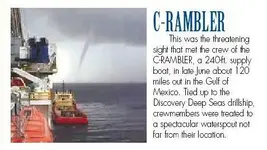S
Smee
Guest
- #1
Thread Owner
I have some questions, and they are legitimate ones in light of the oil spill in the Gulf of Mexico . . .
When a hurricane comes ashore, it is carrying water that it picked up from the ocean . . . it doesn't pick up more water as it passes over land. The evaporation is not there. Thus all the rain comes from the Gulf of Mexico if you live between Texas and Florida.
Now, we all know that the reason the oil floats is because it is lighter than water. So, wouldn't a hurricane pick up quite a bit of the spilled oil? Of course it would.
So, where will the oil go? If you live in an area affected by the hurricane, tropical storm or even tropical wave . . . it will fall on the land in its path. Now comes one important question: Will this stuff still be flamable?
I wonder if we will wake up to large swaths of land burning because of the oil spilled onto our cities and towns. I wonder about the driving conditions . . . highways covered with fresh oil might be a bit slick.
What about the productive land where we grow our crops in the south? Will the oil spread throughout the area render the soil unusable for decades?
What opinions do the members here have? Anyone with knowledge about this scenario?
When a hurricane comes ashore, it is carrying water that it picked up from the ocean . . . it doesn't pick up more water as it passes over land. The evaporation is not there. Thus all the rain comes from the Gulf of Mexico if you live between Texas and Florida.
Now, we all know that the reason the oil floats is because it is lighter than water. So, wouldn't a hurricane pick up quite a bit of the spilled oil? Of course it would.
So, where will the oil go? If you live in an area affected by the hurricane, tropical storm or even tropical wave . . . it will fall on the land in its path. Now comes one important question: Will this stuff still be flamable?
I wonder if we will wake up to large swaths of land burning because of the oil spilled onto our cities and towns. I wonder about the driving conditions . . . highways covered with fresh oil might be a bit slick.
What about the productive land where we grow our crops in the south? Will the oil spread throughout the area render the soil unusable for decades?
What opinions do the members here have? Anyone with knowledge about this scenario?





